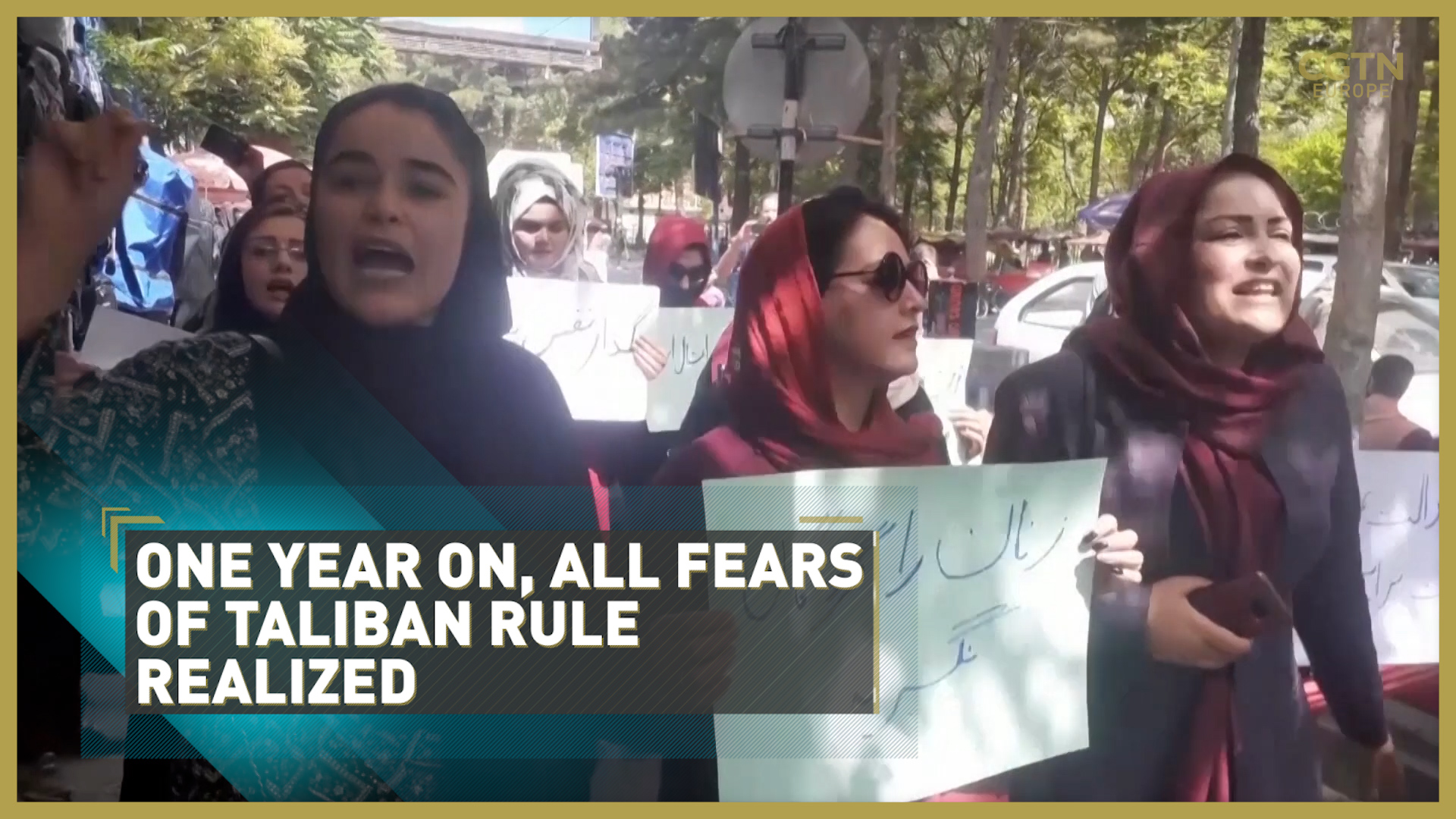06:36

It's been one year since the international community handed power back to Taliban forces in Kabul, leaving the Afghan people to a life once again under Taliban rule.
The new Taliban leadership assured the international community that they would not return to the oppressive tactics experienced by Afghan people in the 1990s, promising they were a more progressive stripe of Islamic religious government.
Afghanistan has also experienced a range of natural disasters in the past year, including droughts, earthquakes and floods.

The Taliban police the streets of Afghanistan. /Reuters
The Taliban police the streets of Afghanistan. /Reuters
What is the situation today?
The real geopolitical implications of Taliban rule are worse than many realize, says former Afghan permanent representative to the United Nations Mahmoud Saikal.
"A flawed peace process orchestrated mainly by the United States, Pakistan and Qatar, and also an internal plot within the Afghan government structure, had already enabled the Taliban to conquer the country militarily," Saikal told CGTN's The Agenda. "What happened within months is state structures started crumbling and the road was paved for losing the gains of the past 20 years."
READ MORE
CGTN special: Cost-of-living crisis across Europe
Meet the 'sappers' dealing with Ukraine's unexploded bombs
Which food has the worst environmental impact?
The problems soon began to mount, Saikal said. "After the Taliban takeover of Kabul, a few things have happened," he continued. "The country faced its worst humanitarian catastrophe ever – within months, over 60 percent of our population became aid-dependent. This year alone, the UN response calls for $4.4 billion, but only 40 percent has been funded so far.
"We faced the worst economic collapse ever, with a dysfunctional banking system and poverty and unemployment at the highest level, according to the latest report of the UN. We have lost 700,000, but I would say between 700,000 and 1 million jobs in the past year."

Women covered head to toe in burqas. /Reuters
Women covered head to toe in burqas. /Reuters
Women disappearing from public view
The fears voiced by women's groups and NGOs around the world as the Taliban took power have quickly been realized.
In May 2022, the Taliban ordered women to cover their faces in public – a return to their past hardliner decrees and an escalation of restrictions on girls and women. If a woman did not comply, her closest male relative faces prison or firing from state jobs.
"We've been witnessing the worst human rights violations ever, in particular against our women and girls, to the point that they are being erased from public life nowadays," confirmed Saikal.
In those parts of the country that have put up resistance to Taliban rule, the situation is considerably worse, said Saikal: "Taliban war crimes and crimes against humanity continues in different parts of the country, especially in the northeast provinces of Afghanistan, where they face opponents."

A few dozen women protested the new regulations to cover their faces. /Reuters
A few dozen women protested the new regulations to cover their faces. /Reuters
Breeding ground for terror
Aside from the problems for Afghanistan's women, one of the key concerns when the Taliban returned to power was that the country would once again become a haven for Islamic terrorists.
The justification for the invasion of Afghanistan was the U.S.-led 'War on Terror': The U.S. aimed to dismantle al-Qaeda, which had executed the September 11 attacks, and remove the Taliban government which it said had given safe harbor to terrorists.
Now the Taliban have returned to power, that fear appears to have been realized with the recent killing of al-Qaeda chief Ayman al-Zawahiri in Kabul.
"Afghanistan is turning into the breeding ground of terror for regional and global terror groups are returning to Afghanistan," said Saikal. "The recent presence and killing of a leader, Ayman al-Zawahiri in Kabul, is a clear sign of that. "
Saikal worries that this is just a taste of things to come. "The Taliban have taken the initiative of establishing three to 10 madrasas (religious schools) in each district of Afghanistan," he said.
"They have already started this process. We have around 400 districts, so you can imagine that within the next few years, we will see the rise of the new generation of the Taliban – highly radicalized extremists ready to commit suicide."

Taliban soldiers are a constant presence for the Afghan people. /Reuters
Taliban soldiers are a constant presence for the Afghan people. /Reuters
An international dilemma
Before the regional neighbors and wider international community embrace the Taliban, Saikal thinks that the will of the Afghan people needs to be considered.
"Half of our population, the women and girls of Afghanistan, see Afghanistan as a prison and therefore, naturally, they don't accept the Taliban," he said. "As far as the men are concerned, they, too, have been suffering the worst violations of human rights.
"The Taliban have failed to project forward a vision of how to take the country out of this current mess.... There is no agenda for an inclusive government. They have come in power by force, and they reckon they enjoy the support of the people. There is nothing to show that. There is no survey. There is no referendum. There is no election, nothing."
At the recent conference on Afghanistan in Tashkent, there was a call for all the countries in the region to play a constructive role in the reconstruction of Afghanistan. However, Saikal thinks that anything that strengthens the Taliban politically or militarily will worsen the situation which puts the wider international community in a difficult place.
"There is a fine line drawn on how to make sure that we help the people of Afghanistan without further strengthening the capabilities of the Taliban," he warned. "The international community has been doing that to certain extent – somehow engaging the Taliban in the hope that the Taliban would change. But unfortunately, the experience of the one year shows clearly that the Taliban will not change."

